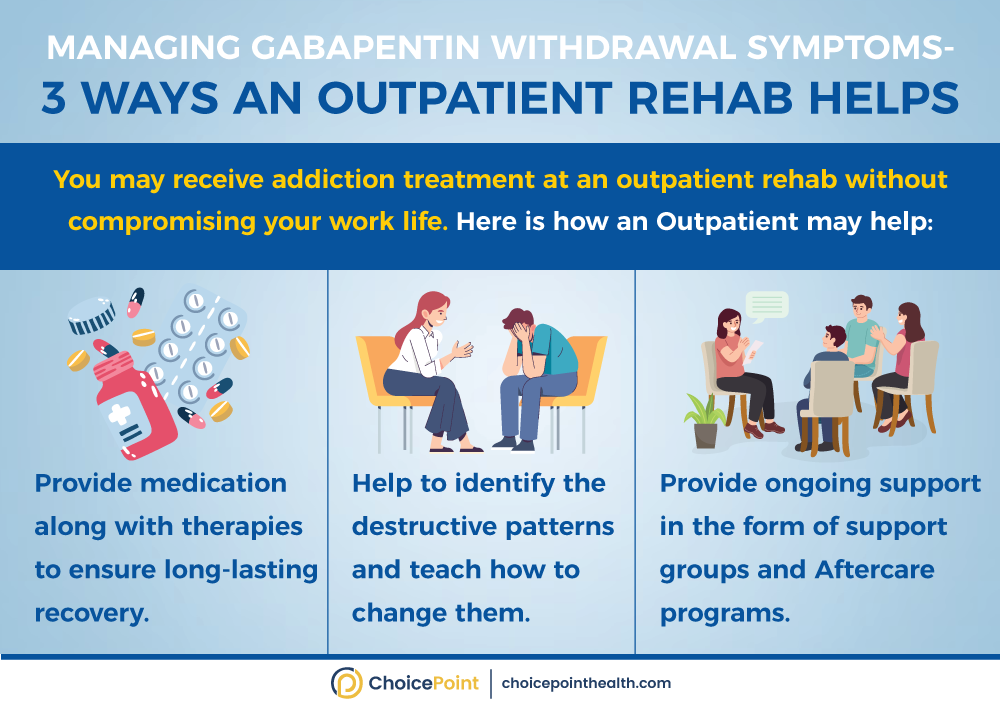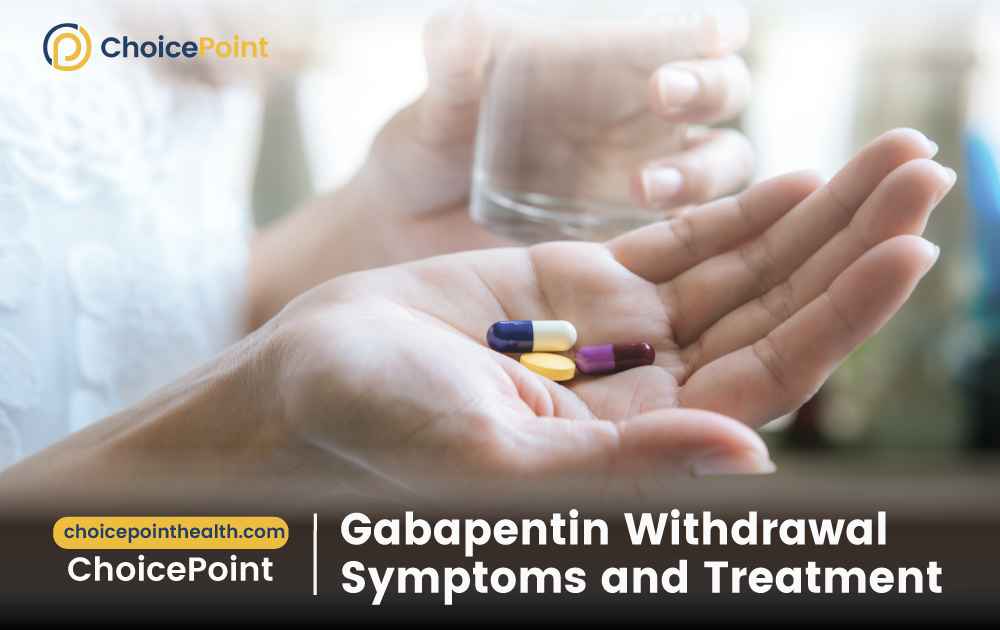Gabapentin is a prescription medication frequently used for treating seizures and nerve pain, but it may also become habit-forming as it leads to dependence. If you or a loved one has been regularly taking Gabapentin for a long time, you should be mindful of the possibility of Gabapentin withdrawal when discontinuing its use. In this article, let’s explore Gabapentin withdrawal symptoms and the treatment options available to help deal with these symptoms.
ChoicePoint is a co-occurring addiction treatment center where our DEA-certified addiction specialists are available round-the-clock and provide medical detox. For information about Gabapentin withdrawal symptoms and our doctors may help, please call us at 844.445.2563.
Table of Contents
First Thing First- What is Gabapentin Withdrawal
When an individual discontinues taking medicine after a prolonged period, they may notice signs and symptoms of withdrawal. During this time, the body and brain become accustomed to its presence, so much so that they adjust their functions accordingly. When Gabapentin is no longer present, there needs to be readjustment which can result in physical or psychological symptoms as side effects.
Common Gabapentin Withdrawal Symptoms- A Timeline
Gabapentin withdrawal can be both exciting and unpleasant for those who have become dependent on the drug. The withdrawal symptoms of Gabapentin can vary depending on the duration and amount of use. After the last dosage, Gabapentin withdrawal symptoms may begin after the first 12 to 7 hours and may last up to 10 days.
Here is the timeline:
12-48 Hours
- Anxiety
- Insomnia
- Changes in appetite
- Sweating
- Headaches
- Seizures
- Tremors
- Suicidal thoughts
- Irritability
- Depression
Day 2 to 3
- Restlessness
- Disorientation
- Confusion
- Agitation
Day 4 to 6
- Increasing confusion, agitation, and anxiety
- Headaches
- Light sensitivity
- Nervousness
Do you have a hard time coping with Gabapentin withdrawal symptoms? It is time to seek professional help and get well in no time—Contact ChoicePoint’s ever-ready team of qualified doctors who offer personalized addiction treatment programs and accept all insurance. Call us at 844.445.2563 now!
Severe Gabapentin Withdrawal Symptoms- Who is at Risk
Gabapentin addiction does not form in one day; it takes time to develop a dependence on a substance. Here are some factors that increase the chances of forming a Gabapentin addiction:
- Taking Gabapentin regularly for a prolonged period
- Using the medication without a doctor’s prescription and guidance
- Taking Gabapentin at high doses
- Using someone else’s prescription
- Mental health conditions

How Does Outpatient Rehab Work?
Is Going to Cold Turkey an Option?
If you are suffering from Gabapentin addiction and want to quit suddenly, it is probably not a good idea because:
- Can cause severe health complications
- May cause seizures
- Increased risk of disorientation and confusion
The best way is by looking for Addiction Treatment Centers near you that offer a Medical Detox or a MAT program. ChoicePoint is a co-occurring addiction treatment center that offers online MAT and accepts all insurance.
Treatment Options for Gabapentin Withdrawal
If anyone is suffering from Gabapentin withdrawal, they should seek immediate help from professional addiction specialists. Medication-assisted therapy, counseling, and behavioral therapies are commonly used to treat Gabapentin withdrawal symptoms.
Here are some of the most common treatment options for Gabapentin withdrawal:
a. Tapering Off
One of the most popular methods for dealing with Gabapentin withdrawal is progressively decreasing the dose over time. This can help to reduce the severity of the Gabapentin withdrawal symptoms and make the withdrawal process easier to handle.
b. Medications
Medication may be recommended in some instances to help control the symptoms of Gabapentin withdrawal. These may include anti-anxiety drugs, anti-nausea meds, or sleep aids.
c. Therapy
Therapy can also assist with the psychological side effects of Gabapentin discontinuation. Cognitive-behavioral treatment, for example, can help people identify and change negative thought habits that may add to their symptoms.
d. Support Groups
Individuals can interact with others going through comparable situations through support groups. This is especially useful for dealing with the mental and psychological elements of Gabapentin withdrawal.
The safest method to cope with Gabapentin withdrawal symptoms is gradually reducing your dosage while under a doctor’s care. To schedule an appointment with Choicepoint’s doctors, call us at 844.445.2563.

How Long Does Gabapentin Withdrawal Last?
Gabapentin Withdrawal Symptoms and Treatment- Choose ChoicePoint
Gabapentin withdrawal can be difficult and potentially dangerous for people addicted to the medication. Individuals with Gabapentin withdrawal symptoms should seek expert assistance from a healthcare practitioner. As Gabapentin abuse grows, researchers must understand the condition better and create more effective therapies for people addicted to the medicine.
At ChoicePoint, you may find the following addiction treatment programs:
- Medication-Assisted Addiction Treatment Program
- Intensive Outpatient Addiction Treatment Program
- Outpatient Addiction Treatment Program
- Detox Addiction Treatment Program
We also offer comprehensive therapies to assist the transition process:
- Cognitive-Behavioral Therapy Program
- Dialectical Behavior Therapy Program
- Group Therapy Program
- Individual Therapy Program
- Family Therapy Program
- Dual Diagnosis Treatment Program
If you have let your use of Gabapentin get out of hand, our DEA-certified doctors will help you at every step during treatment for Gabapentin withdrawal symptoms. Contact us now at 844.445.2563 to schedule an in-person or virtual appointment.
Medical Disclaimer:
ChoicePoint aims to improve the quality of life for people struggling with substance use disorder and mental health issues. Our team of licensed medical professionals research, edit and review the content before publishing. However, this information is not intended to be a substitute for professional medical advice, diagnosis, or treatment. For medical advice please consult your physicians or ChoicePoint's qualified staff.









Review Gabapentin Withdrawal Symptoms and Treatment.